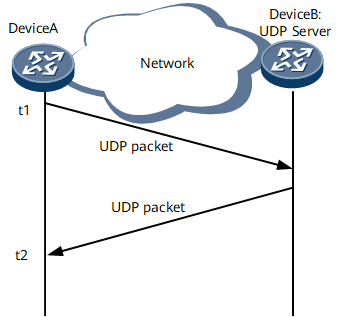UDP Test
Many services on networks use the User Datagram Protocol (UDP). Should the quality of a service deteriorate, users are unable to determine whether the deterioration arises from a faulty service or UDP performance. Network quality analysis (NQA) UDP tests can help solve this problem. UDP performance is checked, and users can identify the cause of the service quality deterioration.
To this end, NQA UDP tests measure the communication speed between a host and an NQA server, which are both Huawei products. Figure 1 demonstrates the UDP test process.
- Device A constructs a UDP packet, sends it to the NQA server, Device C, and adds timestamp t1.
- Once the UDP packet is received, Device B returns the packet to Device A and adds timestamp t2.
Upon receipt, Device A calculates the duration between the time Device A sent the UDP packet and the time Device A received it. The time taken reflects the UDP performance on the network.
If the delay is longer than the specified timeout period, the network is congested and UDP packets will be counted as lost packets.
A UDP test can also measure the packet loss rate using the following formula:
Packet loss rate = Number of lost UDP packets/Number of sent UDP packets
The packet loss rate further reflects network status.
